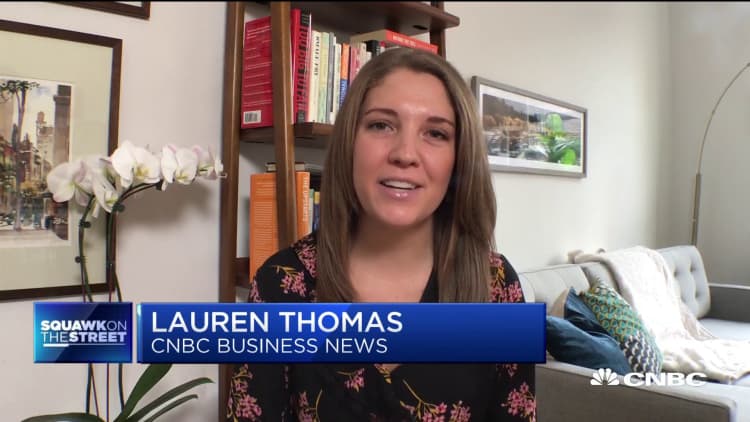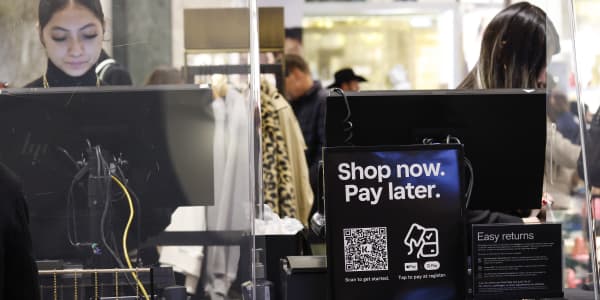First comes the holiday season, then the flood of returns.
With e-commerce sales exploding during the coronavirus pandemic, retailers may see more returns than ever before. After all, shoppers do not have the chance to touch or try on the items they're ringing up on the internet. Then, there are the unwanted gifts: the sweaters from grandma that don't fit or coffee makers they didn't really need. A forecast from Salesforce estimates there will be roughly $280 billion worth of returns this holiday season.
And so, retailers are looking for solutions to this billion-dollar problem, to give shoppers a way to make returns other than through the mail, which packs on shipping and handling costs for companies, and can be more burdensome for consumers.
Amazon, as one example, has been working with Kohl's to accept its returns at hundreds of its department stores. Third-party returns platforms like Happy Returns and Narvar are teaming up with brands to accept their returns at pop-up kiosks in malls, or at places like Walgreens and FedEx. Mall owners are looking for other ways to help, too.
"Returns are probably the most important way in which you retain customers in retail," said Suketu Gandhi, a partner at global management consultant Kearney's digital transformation division.
When people have a good experience making a return, they're likely to return to shop from that retailer again, and develop greater trust with the brand, he explained.
But the reverse logistics of the returns process is "probably the weakest area of logistics right now," in the retail industry, he said. "Companies should be using a physical location to accept returns," because it helps slash expenses and also is less painful for consumers, Gandhi added.
The biggest U.S. mall owner Simon Property Group said Tuesday it is partnering with Narvar to give customers the option of dropping off returns at the concierge desk at a half-dozen of its malls, including The Mills at Jersey Gardens in New Jersey and the Forum Shops at Caesars Palace in Las Vegas. The service is kicking off during the holidays but will last indefinitely, the companies said.
To start, about two dozen retail brands will be participating in the platform, the companies said, including Levi's, Gap, Vera Bradley and Dockers. When initiating a return online, customers for these brands will now begin to see nearby Simon malls as an option, in addition to putting a return in the mail. They'll simply bring a QR code to Simon's guest services desk, where a Simon employee will handle the rest of the returns process.
The service comes just in time for the holidays, and well in advance of Jan. 2, which is typically the busiest day for holiday returns in the United States.
This year the process of returning items could be even more challening. With Covid-19 cases rising, cities and states could reimpose lockdown measures that could temporarily close stores or reduce operating hours.
Not to mention, that retailers have closed thousands of stores this year, in a bid to trim unprofitable pieces of their businesses and revive performance. But that also means fewer stores to offer returns. Shoppers may buy an item from a favorite retailer online, and no longer have a physical store nearby for returns.
"As retail responded to the pandemic, we saw the increasing importance of return drop-off points," said Brady Stewart, senior vice president and managing director of Levi's direct-to-consumer division. "If anything, the pandemic has highlighted that consumers like having options for shopping, purchasing and returns."
According to Amit Sharma, founder and CEO of Narvar, 60% to 70% of returns pre-pandemic were transacted in stores, as most people would prefer to not have to print off a return label from home, nor wait for a refund after receiving confirmation that their returns have been received in the mail.
"The brands and merchants that we speak with still see a value of being in the mall, even if they don't have the same store footprint anymore," Sharma said.
As for Simon, if more people come to its malls to make returns, it could potentially boost the number of shoppers that visit stores while they are there, or they may grab a snack or a drink at the food court.
"Offering a variety of services at our properties helps consumers consolidate errands and save time, driving incremental visitation," said Andy Hutcherson, senior vice president of innovation and customer experience for Simon.
A 'crescendo' of returns
This holiday season will put retailers' return policies and processing to the biggest test yet.
Online retail sales are expected to account for 14.4% of all retail spending in the U.S. this year, according to data from eMarketer. The firm said e-commerce sales are expected to total $794.5 billion in 2020, representing year-over-year growth of 32.4%, the firm said, compared with a pre-pandemic forecast for an increase of just 18%.
Younger consumers are planning to take back more unwanted items, with 40% of millennial consumers saying they plan to make more returns this holiday season compared with last year, according to a study by PwC. Overall, 20% of consumers polled by the firm plan to be sending back more items during the 2020 holidays. PwC surveyed 1,010 consumers, and within that 242 millennials, last month, about their holiday shopping plans.
Fifty-three percent of respondents also said retailers' return policies are impacting where they choose to shop this year.
"Retailers need to be looking at the entire picture," said Tyson Cornell, a consumer markets industry leader at PwC. "Policies are going to have to change."
Throughout the pandemic, many retailers have adjusted their return policies, often extending them, understanding that it's harder for people to get to stores or print off a return label from their home.
This holiday season, with more consumers starting their holiday shopping early, the co-founder and CEO of Happy Returns, David Sobie, said he anticipates returns will be flowing through the system for weeks, rather than all at once come January.
A survey released Monday by the National Retail Federation found 42% of holiday shoppers said they have started their purchasing earlier this season than they normally do. NRF surveyed 8,362 adult consumers from Nov. 2 through Nov. 9.
"In the past, we have seen these two peaks," Happy Returns' Sobie said. One the first week of December, after Black Friday, and another during the first week of January.
"But I think this year it is going to be a lot more spread out," he said. "There is going to be less of a peak with returns ... and more of a crescendo of volume building."





